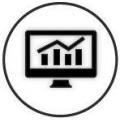The Berkeley Digital Humanities Working Group began in 2011 as a place to facilitate interdisciplinary conversations around topics in the Digital Humanities (broadly defined). We welcome participants from all disciplinary backgrounds, beginners and experts in digital skills, students, faculty, and staff. The agenda for our biweekly meetings is participant driven, and we typically hold a varie
Sign up for our weekly newsletter!
This is an archive of our past training offerings. We are looking to include workshops on topics not yet covered here. Is there something not currently on the list? Send us a proposal.
This workshop introduces the basic concepts of Deep Learning - the training and performance evaluation of large neural networks, especially for image classification, natural language processing, and time-series data.
Geospatial data are an important component of social science and humanities data visualization and analysis. This workshop will introduce basic methods for working with geospatial data in Python using GeoPandas, a relatively new Python library for working with geospatial data that has matured and stabilized in the last few years.
Participatory action research (PAR) is a framework for creating knowledge that is rooted in the belief that those most impacted by research should take the lead in framing the questions, design, methods, analysis and determining what products and actions might be the most useful in effecting change.
This three-part series will cover the following materials:
Part 1: Introduction
The Somali, Ethiopian, Eritrean, South Sudanese, Sudanese Student Association (SEE§A) (formerly as Horn of Africa Student Association) is a student-based organization that focuses on the further academic, professional, social, and cultural advancement of Somali, Ethiopian, Eritrean, South Sudan and Sudanese identifying students on the University of California, Berkeley campus.
This workshop will focus on organizing, coding, and analyzing qualitative data using ATLAS.ti, a qualitative data analysis (QDA) software program for which D-Lab provides support.
This workshop introduces the basic concepts of Deep Learning - the training and performance evaluation of large neural networks, especially for image classification, natural language processing, and time-series data.
The Critical University Studies (CUS) working group convenes and cultivates a critical scholarly community that contends with issues of power, race, and gender in higher education.
This class will cover the basics of Excel, from simple formulas (SUM, COUNTIF) to more complex Excel features like Macros and the Data Analysis ToolPak. By the end of both sections, students will be able to employ Excel skills to open source policy data sets. These skills are transferrable to any sector.
Topics Covered Will Include:
Geospatial data are an important component of social science and humanities data visualization and analysis. This workshop will introduce basic methods for working with geospatial data in Python using GeoPandas, a relatively new Python library for working with geospatial data that has matured and stabilized in the last few years.
This interactive workshop goes into the nuts and bolts of effective execution of research process. The goal is to lay out best practices in implementing a research project to make the process more seamless, productive and enjoyable. Through experiential learning exercises, participants will have the opportunity to practice some of the concepts in a supportive setting.
This four-part, interactive workshop series is your complete introduction to programming Python for people with little or no previous programming experience. By the end of the series, you will be able to apply your knowledge of basic principles of programming and data manipulation to a real-world social science application.
Raster data are used to represent geographic phenomena that are present and can be measured anywhere in a study area, like elevation, temperature, rainfall, land cover, soil type, etc. These data are a valuable resource for social scientists, planners, and engineers as well as natural scientists. This workshop will introduce basic raster concepts and methods for working with raster data in R.
This is a six-hour tutorial on machine learning in R that covers data preprocessing, cross-validation, ordinary least squares regression, lasso, decision trees, random forest, xgboost, and superlearner algorithms.
Geospatial data are an important component of social science and humanities data visualization and analysis. The R programming language is a great platform for exploring these data and integrating them into a research project.
Geospatial Data in R, part 2: Geoprocessing and analysis
The Computational Text Analysis Working Group (CTAWG) features demos, tutorials, and ongoing projects through which we are learning to use an array of computational text analysis approaches including: topic modeling, TF-IDF, dictionary methods, supervised machine learning, cosine similarity scores, words-to-vectors, grammar parsing, regular expressions, and more.
The power and learning in social media working group is an interdisciplinary group that exists to support researchers, practitioners, artists and anyone else interested in digital technologies, sociocultural dimensions of learning, and critical race perspectives on social media activity.
This three-part series will cover the following materials:
Part 1: Introduction
The Somali, Ethiopian, Eritrean, South Sudanese, Sudanese Student Association (SEE§A) (formerly as Horn of Africa Student Association) is a student-based organization that focuses on the further academic, professional, social, and cultural advancement of Somali, Ethiopian, Eritrean, South Sudan and Sudanese identifying students on the University of California, Berkeley campus.






